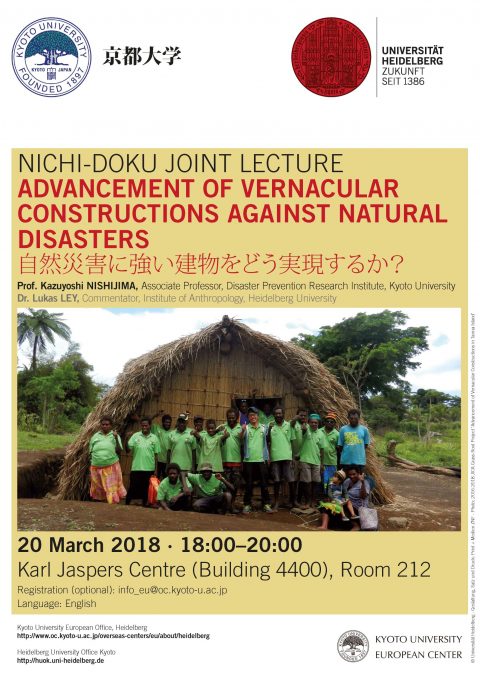Abstract
Typhoons, hurricanes and cyclones have caused significant damages to buildings especially in developing countries. Cyclone Pam, which impacted the Republic of Vanuatu in March 2015, is not the exception. Among the number of islands in the country, Tanna island is one of the islands where damages to houses were most significant. However, compared with the number of damaged houses the number of the fatality was reported to be small. Moreover, it is reported that the recovery of houses was relatively swift. DPRI Kyoto University conducted a survey on the impact of the cyclone about one month after the event. Our team has continued research works and field surveys in order to clarify why the impact to human lives and follow-up consequences are relatively small compared to natural hazard events of similar magnitude in other regions.
This lecture reports our activities and their outcomes. Further, it introduces to an ongoing JICA grassroots project “advancement of vernacular constructions in Tanna island.” By sharing our findings and lessons we have learnt from the island, the lecture encourages participants to discuss on the possibilities/difficulties to export those findings and lessons to other regions of the world.
Report
Schedule
| 18:15 | Welcoming Address |
|
18:20
|
Lecture Dr. Kazuyoshi Nishijima (Disaster Prevention Research Institute, Kyoto University) “Advancement of Vernacular Constructions against Natural Disasters” |
|
19:00
|
Commentary Dr. Lukas Ley (Institute of Anthropology, Heidelberg University) |
| 19:20 | Discussion |
| 19:45 | Reception |
| 20:30 | Closing |
Registration & Contact
Deadline: 12 March
Please send us an e-mail containing your name and affiliated organization to the following address:
Kyoto University European Centre Heidelberg Office
Email: info_eu@oc.kyoto-u.ac.jp
Tel: +49-(0)6221-54-30034
The registration is not required, but we would be thankful if you did.
Profile
Kazuyoshi Nishijima (Associate Professor)
Associate Professor, Disaster Prevention Research Institute, Kyoto University
Dr. Kazuyoshi Nishijima worked at ETH Zurich (2004-2010) and at Technical University of Denmark (2011-2013). During these periods his main research interest has been engineering decision analysis. As its applications he has been working on various types of engineering decision problems, including: strategic decisions on adaptation of civil infrastructure to changing climate; real-time decision for technical facility operations as well as evacuations of people and assets in emerging natural hazard events; decisions on maintenance of deteriorating structures. In parallel, he also has been working on modeling of typhoon-induced wind risks in corporation with the insurance industry. Since September 2013 he is working at Disaster Prevention Research Institute, Kyoto University. His research there is directed to better understand physical and socio-economical processes leading to consequences of individual buildings as well as communities at different levels, which facilitate decisions on sustainable development in societies under changing environment.
Dr. Lukas Ley
Institute of Anthropology, Heidelberg University
Dr. Lukas Ley, social anthropologist by training, has conducted in-depth research in Semarang, an Indonesian city acutely threatened by coastal erosion and tidal flooding. He graduated from the University of Toronto where his doctoral research was supervised by Prof. Tania Li. Ley’s PhD thesis entitled “Building on Borrowed Time: The Horizons of Infrastructural Breakdown in Semarang” investigates the social contours and management of “rob”—the Indonesian term for tidal flooding. Recent publications include the article “On the margins of the hydrosocial: Quasi-events along a stagnant river” to appear in Geoforum and the article “‘Dry feet for all’: Flood management and chronic time in Semarang, Indonesia” published in the Austrian Journal of South-East Asian Studies.
* The lecture series “Nichi-Doku Joint Lecture” is organized in close cooperation of the Kyoto University European Center, Heidelberg Office, and the Heidelberg University Office, Kyoto, the liaison offices of both universities in Japan and Germany. It aims at promoting and strengthening research exchange between Heidelberg University and Kyoto University.



